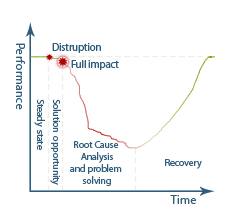Management has in reams of specifications and procedures all the information it needs about “things that go right.” What it often lacks is information on “things gone wrong.” Minimalism, a comprehensive new architecture for process improvement that elicits and exploits synergies among inventory management, quality and production control, and learning from the management of disruptions to enable businesses to “do more, better, with less,” is premised on the collection only of data related to exceptions.

The predictable impact of disruption on an Enterprise, Performance or Process.
Problem solving in Minimalism emphasizes understanding an entire business process in order to ensure that solutions significantly improve the output not just of one process step, but of an entire process. It involves using the business environment as a laboratory in which solutions can be hypothesized and statistically sound experiments designed and tested, with the object of developing sets of statistically validated models of all significant processes.
The systematic marshaling of physical, statistical, and control models builds process knowledge to levels previously unattainable. The knowledge base that evolves from modeling and refining processes both accelerates the optimization of existing processes and facilitates the planning and design of new processes.
Finding that they’re dealing with far fewer interventions, less, and more highly focused, information, and manifestly clearer paths to improvement boosts morale among those involved in the practice of Minimalism. Drastic reductions in inventory and work-in-process can be seen immediately and generate short-term contributions to the bottom line. Long term, enhanced problem-solving capabilities, robust process knowledge, and production flexibility ensure sustainable bottom line improvement.
These benefits are part and parcel of what is perhaps the greatest benefit of Minimalism. In this era of advanced manufacturing technologies and virtual networks, with machine capacity readily available for purchase or rent and little to impede the transfer of technology and technological know-how, it is process knowledge and expertise—intellectual as opposed to physical assets—that increasingly sets firms apart. Minimalism is at heart a systematic approach to managing intellectual assets. Focusing expertise exclusively on disruptions and “things gone wrong” provides a basis for building a selective body of knowledge that can serve to minimize what goes wrong in the future.
The principles of Minimalism have been applied successfully to activities throughout the value chain. A number of client firms and consulting organizations with which MNI Partners has been associated have embraced Minimalism as a guiding framework for their own pursuits.